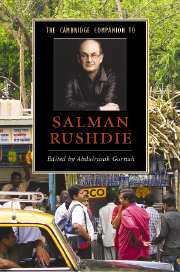Book contents
- Frontmatter
- 1 Introduction
- Part I: Themes and Issues
- Part II: Studies of Individual Texts
- 6 Tricksters and the common herd in Salman Rushdie’s Grimus
- 7 Themes and structures in Midnight’s Children
- 8 Reading ‘Pakistan’ in Salman Rushdie’s Shame
- 9 The Satanic Verses: ‘To be born again, first you have to die’
- 10 The shorter fiction
- 11 The politics of the palimpsest in The Moor’s Last Sigh
- 12 The Ground Beneath Her Feet and Fury: The reinvention of location
- Guide to further reading
- Index
- Series List
10 - The shorter fiction
from Part II: - Studies of Individual Texts
Published online by Cambridge University Press: 28 November 2007
- Frontmatter
- 1 Introduction
- Part I: Themes and Issues
- Part II: Studies of Individual Texts
- 6 Tricksters and the common herd in Salman Rushdie’s Grimus
- 7 Themes and structures in Midnight’s Children
- 8 Reading ‘Pakistan’ in Salman Rushdie’s Shame
- 9 The Satanic Verses: ‘To be born again, first you have to die’
- 10 The shorter fiction
- 11 The politics of the palimpsest in The Moor’s Last Sigh
- 12 The Ground Beneath Her Feet and Fury: The reinvention of location
- Guide to further reading
- Index
- Series List
Summary
Salman Rushdie's shorter fiction, the novella Haroun and the Sea of Stories (1990) and the short story collection East, West (1994), is distinguished by old-fashioned qualities associated with storytelling: the ability of a good story to give counsel and comfort and the potential for remaining meaningful well beyond the season in which the tale was first told. Almost any reading of these works, Rushdie's first publications after the fatwa of 1989, is likely to seem overly determined by the fateful event, but in the final analysis, these are books that outlast this immediate context to pose and answer enduring questions about home and the world, the power of speech and language, and the promise of stories. These themes are not new, even if the context imbues them with unprecedented urgency. The challenge and danger of writing fiction about issues that matter - language, religion, politics, history, identity, tyranny, migrations - have been familiar to the author since his turn to subcontinental material in Midnight's Children and continue to be relevant in works that follow.
Conceived in a commitment made to his son Zafar to write a book for children, Haroun and the Sea of Stories, published a scant year after the fatwa, is a book that keeps its word. 'There's no more absolute thing', Rushdie explained, 'than a promise to your child. You can't break it.' Looking back on the dismal months following the Ayatollah Khomeini's fatwa and his confinement, Rushdie admits to feelings of doubt: 'I spent an awful lot of time thinking I would never write again, not because I couldn't but because I didn't want to.'
- Type
- Chapter
- Information
- The Cambridge Companion to Salman Rushdie , pp. 139 - 152Publisher: Cambridge University PressPrint publication year: 2007
- 1
- Cited by

